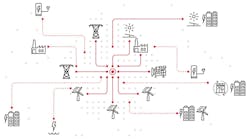Twenty six partners of the Smart Energy Collective have signed a renewed cooperation agreement for the approval of the second phase of its smart grid initiative, which involves the development of five large-scale smart grid demonstration projects in the Netherlands.
The signing follows a successful preparation period, and marks the start of the actual design phase of the five trial test sites. The projects will be implemented at Schiphol airport, in a few offices of ABB and Siemens, and in residential districts in Gorinchem, Heerhugowaard, and Goes. Intelligent energy systems, also known as smart grids, are essential for the realization of an affordable and reliable sustainable energy supply. At the same time, the Smart Energy Collective wants to offer an important contribution to the standardization that this new field requires.
The Smart Energy Collective is one of the largest sector-transcending initiative in Europe for the concrete development of smart grids and services. Current participants in the project (in alphabetical order) are: ABB, Alliander, APX Endex, BAM, DELTA, DNV KEMA Energy & Sustainability, Efficient Home Energy, Eaton, Eneco, Enexis, Essent, GEN, Gemalto, Heijmans, IBM, ICT Automatisering, Imtech, KPN, Nedap, NXP Semiconductors, Philips, Priva, Siemens, Smart Dutch, Stedin and TenneT.
Based on the implementation of five demonstration projects involving different user groups—industry, offices, existing residential districts, and newly developed districts—the Smart Energy Collective wants to test the smart grids in actual practice, as well as to provide an important impulse to standardization; the need for this is high.
During a survey conducted during the first phase, it was evident that there are more than 6,000 relevant standards that play a role in the new technologies, which will be introduced to the market over the coming years. Finally, the objective is to create a common market for energy services that is of a sufficiently large scale. Working groups have been established for standardization, market mechanisms, services and business cases, smart grids, privacy and security, and ICT infrastructure, in order to establish a solid foundation for the design of the five demonstration projects, as well as for future projects.
In the first phase of the project, five trial sites were selected in diverging environments as a means of acquiring an all-encompassing overview.
- Industry: The Industry demonstration project will be implemented at Schiphol Airport (the GROUNDS) and is focused on small, medium, and large industries. The objective is to prevent local network congestion and to maintain a local energy balance through the use of local electricity generation with one or more combined heat and power (CHP) plants.
- Offices: The Offices demonstration project will primarily investigate how the flexibility in the energy demand of these offices can be exploited by energy management systems, and the introduction of commercial generating sets with a complete portfolio of offices. The trial test site will consist of a few offices of Siemens and ABB, and potentially other partners in the collective.
- All Electric Residential District: An entirely electric district provides a unique electricity market profile because the entire energy demand is electric, and local generation is effected through means of solar panels. The charging of electric vehicles and space heating, through electric heat pumps, requires flexibility to reduce the peak load. Storage of electricity, potentially supplemented by local generation using biogas-fired CHP plants, supports this flexibility and the network required for this demonstration project. The trial test site will be implemented in Gorinchem.
- Gas and Electricity Network District: This trial test site—which will be implemented in Heerhugowaard—is focused on the potential of the existing residential buildings, where gas and electricity applications are brought into competition with each other. In addition, the project will investigate how to get the best out of these two worlds. This provides many opportunities for cost-efficient sustainable energy solutions with a high market potential.
- District Heating Area: This demonstration project—in Goes—distinguishes itself from other demonstration projects, due to the fully integrated heat and electricity solution. Many possibilities will be investigated, including opportunities for introducing comfort-based services. The desired flexibility will be realized, as well as the smart electricity and heating market optimized on the basis of intelligent underground thermal energy storage systems.

